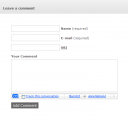I am using my blog as a research tool for my thesis and I am always very happy with comments and feedback on whatever I write. What I find interesting is that the few conversations I have had on this blog almost all shifted to e-mail. When people comment on my site I receive an automatic e-mail which is an option I have enabled in the Discussion tab under Options. At first I was actually searching for the Options>Comments tab but it is named Options>Discussion which implies that any comment to a blog is part of a discussion even if it is just a single remark. This is not how I would define a discussion which I see more as an exchange of multiple opinions or comments. So I would not consider a blog post with just a single comment a discussion. Of course when there are several comments on a post a discussion could emerge but it might as well be single comments on a certain topic which map out a discourse around that topic but not necessarily a discussion. When there is no interaction between the author and/or the commenters I would not define commenting as a discussion.
Another problem I have with discussions on blogs is that they are quite hard to follow. Let me elaborate on this with a quite longish story. When I receive an e-mail that someone has commented on my website it includes the commenter’s name, e-mail and website (optional), see picture. This is because in my Discussion settings I require commenters to fill in name and e-mail fields mainly to keep out spammers but also because I would like to have the commenter’s e-mail for further questions. So why don’t I ask further questions on my blog in a follow-up comment because I am not sure whether they will see if I have replied. I cannot assume that every commenter is a regular reader that will come back to my page to see if I have reacted to their comment. On top of that not all comments require a reaction and they are just plain comments and not questions which might initiate a discussion. Most of the comments I have received are reactions to questions I have asked regarding blogging or blog software and these commenters were kind enough to put in their two cents. How do I know if they come back to my blog and see I have commented on their comment and do they even care?
When you read tons of blogs a day and comment on posts now and then you quickly lose track of where, when and what you commented on. This is the reason I have installed the Subscribe To Comments plugin for my blog which “allows readers to recieve notifications of new comments that are posted to an entry.” (( Jaquith, Mark. “Subscribe to Comments 2.1 .â€? Tempus Fugit | TxFx.net. 27 March 2007 <http://txfx.net/code/wordpress/subscribe-to-comments/>.)) Unfortunately not every blog uses this plugin so it is still hard to keep track of your comments. I recently came across coComment, a commenting service that allows you to track the comments you leave on blogs (and other platforms such as forums.)
 There are also a Firefox extension available that and Greasemonkey script available to automatically enable the coComment tracker when you are writing a comment. The Firefox extension also shows a small alert in the lower right corner if new comments have been posted on conversations you have contributed to and/or are tracking.
There are also a Firefox extension available that and Greasemonkey script available to automatically enable the coComment tracker when you are writing a comment. The Firefox extension also shows a small alert in the lower right corner if new comments have been posted on conversations you have contributed to and/or are tracking.
 These services certainly improve keeping track of my commenting which used to be rather chaotic. More on software constraints concerning commenting and the role of trackbacks later, for now let’s return to the issue of to why my blogging conversations turn to e-mail conversations.
These services certainly improve keeping track of my commenting which used to be rather chaotic. More on software constraints concerning commenting and the role of trackbacks later, for now let’s return to the issue of to why my blogging conversations turn to e-mail conversations.
Comments that you place on other blogs are hardly traceable, they become part of the incredibly large blogosphere. We have to use external services and plugins to keep track of our conversations, if we wish to. I don’t know if commenters on my blog keep track of their comments and therefor I often reply both on my blog and with an e-mail. Because comments arrive in my e-mail inbox with the commenter’s e-mail it is very easy to reply to the comment. Sometimes I ask the reader to reply on my blog for the sake of keeping all my research in one place, but sometimes I forget or the reader finds it easier to hit the reply button again instead of visiting my blog.
Of course this is a specific case being a research blog with very few readers but I would like to argue that the commenting issue is a general issue in the blogosphere. In what way is this built in into the software? This is a question I would like to answer later when I will also address trackbacks and comment RSS feeds.
